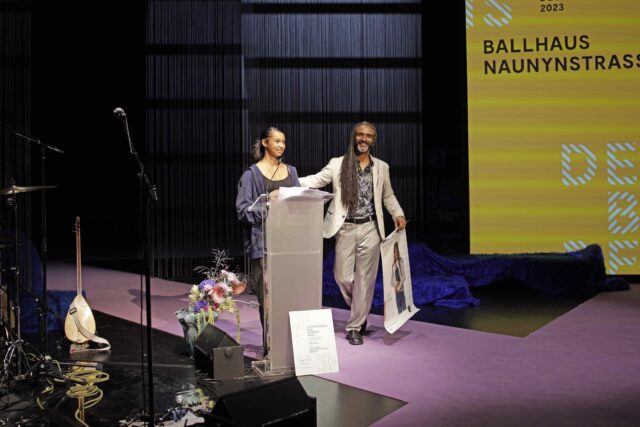
©Zé de Paiva
„Dear Minister of State for Culture, Claudia Roth,
Esteemed members of the jury,
Dear colleagues from the Fonds Darstellende Künste (Performing Arts Fund),
Thank you very much!
I would also like to extend my gratitude to the entire team, both in front of and behind the scenes: the artists who are here today, as well as the colleagues at the back, the technicians who bring the projections, lighting, sound, and streaming to life. Many thanks.
I want to mention that on the other side of the Atlantic, people are watching as well, including in my own home. Many people are doing so because in Brazil, news of this award is spreading everywhere. At my home, it’s my mother, Donna Angelina: Hello, Mom.
I want to express my appreciation to my colleagues and the artists at Ballhaus Naunynstraße, who have brought us this far. Through their persistent efforts, they have maintained and helped me further develop Ballhaus Naunynstraße as a place for art, discussion, encounters, and togetherness.
I want to thank Shermin Langhoff – everything began with her. It was only because this beginning was made that we could start our work and expand the post-migrant perspective. I have great respect for her courage to intervene in this society and open up new spaces. Thank you.
We are delighted about this award – an acknowledgment of our work at Ballhaus Naunynstraße that spans over a decade. In brief, it revolves around decolonization and intersectionality, the visibility of Black people and People of Colour, access, societal participation, the expansion of the arts, and an effort to bring about change in society through the arts.
In a time when parts of society are radicalizing by supporting political parties that disdain what we represent: diversity, protagonists of our own history, independent artists with diverse perspectives; in a time when far-right parties, and even Christian parties have aligned themselves with far-right positions in a populist zeal, to perform well in elections in Bavaria and Hesse, are gaining influence, this theatre award from the government is a signal.
It is both appreciation and an invitation: the cultural work carried out by smaller and medium-sized theatres is of paramount importance to society – it must be upheld. These institutions, due to their size, have the ability to pursue their own agenda, focusing on local topics and maintaining relationships with artists on an equal footing, creating trans-local connections. In their developed diversity, they serve as an expression and experimental stage for diverse cultural and liberal coexistence. The community work we undertake is not a „voluntary“ task; it is a necessity. We are pleased to stand here as Ballhaus Naunynstraße alongside our colleagues from LOFFT in Leipzig, Theaterhaus Jena, and Chamäleon Berlin, as part of this vital and by no means self-evident theatre landscape.
Our work is necessary: to educate colleagues, to network, to create platforms for experimenting with artistic languages and forms, to foster encounters across societal boundaries, to provide enriching experiences and enjoyment.
Theatre is necessary as a mirror – as a cultural practice, to collectively reflect on our coexistence – and as a tangible contribution to building a different society:
Naê Selka de Paiva:
Hello, I’m Naê. Wagner asked me (his youngest artist) to accept this award with him.
Ballhaus Naunynstraße reopened in 2008, and I was born a year later. Even as a baby, I was often present at my parents‘ rehearsals – my father as a dancer and my mother as a lighting technician. As a toddler, I frequently tried to imitate my father’s steps, and sometimes, a technician would take my sister and me on an adventure to explore the attic, where a dragon lived – although it always managed to hide.
When I was nine years old, I danced for the first time at Ballhaus. The piece explored the relationship between Black children and their white grandmothers who grew up during the National Socialist period.
It’s pieces like this that make me happy that Ballhaus Naunynstraße has received this award. While People of Colour work in many theatres, it’s not the same as it is here. Here, People of Colour don’t just perform; they tell their own stories. The stage at Ballhaus Naunynstraße provides People of Colour and queer individuals a space to present themselves and their perspectives.
I hope this award draws attention to Ballhaus Naunynstraße so that more people become interested. Furthermore, I hope it encourages more people to have the courage to tell their own stories.
The events of the past weekend – viewed globally but also here in Germany – have left many of us in a state of shock. „One wants to pull the covers over one’s head,“ as a participant in the Berlin Cultural Committee stated this Monday. But we mustn’t do that if we want to exist.
At Ballhaus Naunynstraße, around 120 artists, each with unique backgrounds and artistic languages, operate. Our work fundamentally consists of a continuous process of translation – of non-understanding and misunderstanding, of searching for and inventing words, and of constant learning about how the world appears and could appear from a different perspective – this is the starting point, the fertile ground for art and for democracy. Difference is an asset to society; it is what allows theatre to thrive, it generates democracy with its sense of fearlessness, and it brings forth democracy as both emotion and rationality.
We are thrilled about this extraordinary recognition of our work, we are excited about this gathering today, in which we – perhaps even more diverse than at previous award ceremonies – celebrate the cultural work of smaller and medium-sized theaters. Both the Theatre Award from the government and this gathering with you tonight are seen as motivation to continue our work.
Thank you very much.


